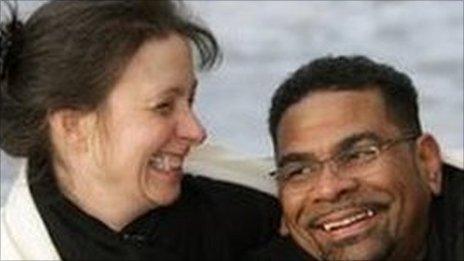Debbie Purdy: Right-to-die campaigner dies
- Published
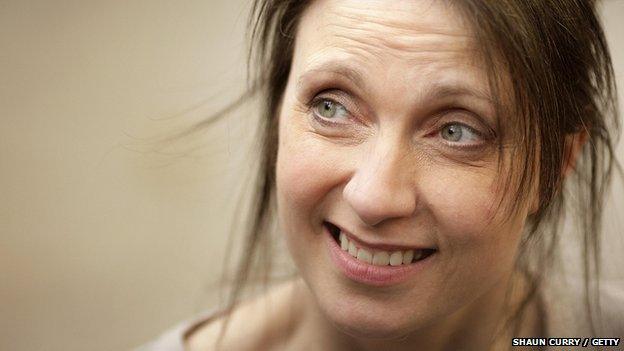
Debbie Purdy fought for a number of years to clarify the law on assisted suicide
Right-to-die campaigner Debbie Purdy, who won a landmark ruling to clarify the law on assisted suicide, has died.
The 51-year-old from Bradford had lived with primary progressive multiple sclerosis (MS) for almost 20 years.
Ms Purdy had spent a year in the city's Marie Curie Hospice and had sometimes refused food. She died on 23 December.
In 2009, she won a ruling to get clarification on whether her husband Omar Puente would be prosecuted if he helped her to end her life.
Lord Falconer, the former lord chancellor, said Ms Purdy's role as a campaigner against the law on assisted suicide was "absolutely key" and she had transformed the debate.
Mr Puente confirmed the death of his wife in a statement, paying tribute to "a much loved wife, sister, aunt and friend".
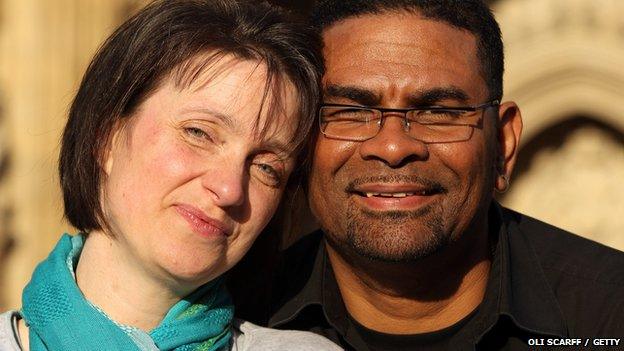
"We would like to thank the Marie Curie Hospice in Bradford for the care the staff gave her, which allowed her last year to be as peaceful and dignified as she wished," he added.
David Ward, Liberal Democrat MP for Bradford East, where the hospice is situated, said: "Debbie was a remarkable human being and despite her condition she was an ebullient character.
"In her own words she said if she was allowed to die it would help her live."
Mr Ward said he would remember Ms Purdy for the "great spirit she had and as a remarkably inspiring person".
Lesley Close, a friend of Ms Purdy and patron of the group Dignity in Dying, said: "Debbie was an amazing person.
"Every moment of life was fun when you were with her."
Lord Pannick, Debbie Purdy's barrister, who first met her in 2008 at the start of her legal battle, said: "Her body was already afflicted terribly by this awful disease, she was in a wheelchair, she was in great pain for much of the time.
"But I don't think I have represented a more energetic client in my professional career."
In her final interview with BBC Look North, Ms Purdy said the painful realities of her condition meant her life was "unacceptable".
She said: "It's painful and it's uncomfortable and it's frightening and it's not how I want to live.
"If somebody could find a cure for MS I would be the first person in line.
"It's not a matter of wanting to end my life, it's a matter of not wanting my life to be this."

Analysis: Nick Triggle, BBC Health Correspondent
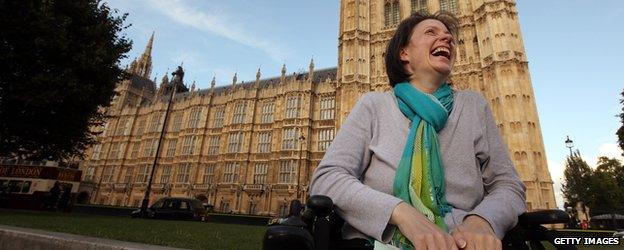
Debbie Purdy's landmark legal victory did not result in a change in the law but it forced the authorities to clarify what the legislation meant in practice.
Ms Purdy had sought assurance over whether her husband would be prosecuted if he helped her end her life.
In 2009 the Law Lords ordered the Director of Public Prosecutions to specify when this might be the case after ruling the law was unclear.
That prompted Keir Starmer - the then director - to publish guidelines in February 2010 setting out what was taken into consideration when weighing up a prosecution.
He said a range of factors should be taken into account, including the motivations of the person assisting and the victim's ability to reach a clear and informed decision about their suicide.
But it still remains an offence to encourage or assist a suicide or a suicide attempt in England and Wales.

As a result of Ms Purdy's battle, five Law Lords ruled in 2009 the Director of Public Prosecutions (DPP) must specify when a person might face prosecution for helping someone end their life.
Former DPP Keir Starmer went on to publish new guidelines in 2010.
But Ms Purdy's condition deteriorated significantly and she was unable to go through with her plan to travel to Dignitas, the Swiss assisted-suicide organisation.
She decided to enter the hospice and begin refusing food intermittently in December 2013.

'Agonising' wait for death
By Emma Glasbey, BBC Look North reporter
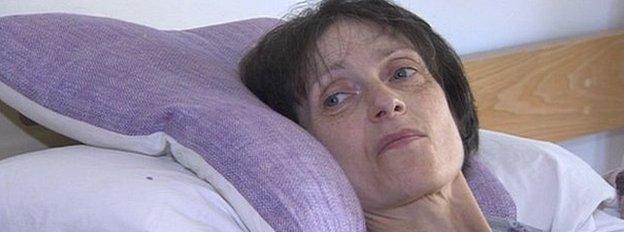
I first met Debbie in October 2008, when she was launching her High Court bid to clarify the law on assisted suicide. Over the years I got to know her really well.
She was an intelligent and witty woman, very interested in news and current affairs. I was lucky enough to film her at university debates, church events and even concerts with her musician husband, Omar.
In June 2013, Debbie telephoned me and asked me to visit her at home. She told me she had decided to end her life. I interviewed her the night before she went into the Marie Curie Hospice in Bradford. She told me she was scared about refusing food, but said her life had become unbearable.
We stayed in touch during her year in the hospice. She was angry and knew that her choice would cause further debate.
I last saw her on 20 December and she told me it was agonising how long it was taking for her to die. She will be greatly missed.

Debbie Purdy had MS for 20 years
A special programme about Debbie Purdy's life - My Right to Die: Debbie's Story - will be broadcast on BBC One in Yorkshire at 22:25 GMT on Tuesday.
- Published29 December 2014
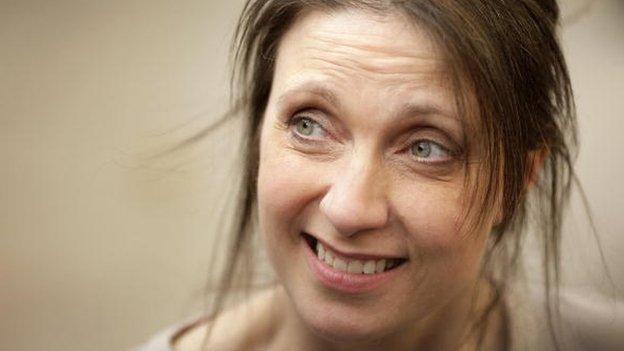
- Published31 July 2013

- Published16 April 2011
